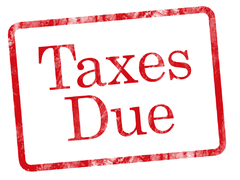 Since I like to write about finance, all of real life is merely raw material for finance lessons, so I beg your pardon while I talk about tax liens in my life.
Since I like to write about finance, all of real life is merely raw material for finance lessons, so I beg your pardon while I talk about tax liens in my life.
A while back I described my astonishment at how low property taxes were for ‘agricultural exemption’ property that I happened to be eyeing for investment purposes. Long story short, I ended up buying a one-fifth interest in raw land in a rural part of the County where I live (Bexar County, TX) agricultural exemption included.
My property investment
I mention my property investment to illustrate the role of tax liens. Bear with me for a bit as I explain a sort of complicated situation.
I only bought one fifth of the property, while the other four-fifths remain owned by four siblings (not mine) who inherited the property. While the family dynamic is opaque to me (they were strangers to me before my investment), I understand that some siblings have sufficient money and some don’t, and some siblings care to pay attention to details like property taxes, and some don’t. Meanwhile, taxes on the parcel of land have gone unpaid for a few years.
This makes me extremely nervous for my investment.
Fail to pay property taxes, and you eventually run the risk of losing your property to the foreclosure power of the taxing authority, typically a city or town. Needless to say, I don’t want to lose this property, and if we leave taxes unpaid for too long, eventually Bexar County will take the land.
Tax lien lenders
Now, you may or may not have ever heard of ‘tax lien’ lenders and investors, so if not, let me be the first to illuminate for you a fascinating little section of the real estate finance world.
Ever since I registered my name on the property deed as partial owner last Spring, I have been inundated with solicitations from tax lien lenders. My name – along with the siblings – shows up publically as owners of a parcel with delinquent taxes owed. Hence, the solicitations.
The tax lien lenders offer to pay our property taxes now owed on the property. Meanwhile, if we did the deal, the lenders would use the real estate as collateral for the loan in the event I (and the sibling heirs) fail to pay back the loan in the future. Tax lien buyers (or in Texas, tax lien lenders) have the power to act like the municipality, and eventually take over the property for themselves in the event of non-payment.
In my complicated situation, with some of us owners unable to pay the taxes or possibly unwilling to put up money for the others for an indefinite amount of time, these lenders make some sense.
Partly I mention this whole anecdote because tax lien investing/lending is an obscure but important part of real estate and municipal finance.
Partly I mention this because tax lien investing may inspire a natural aversion. On the face of it, any lender who has the power to take away your property seems, I don’t know, scary? I mean, regular bankers seem unlikable enough. From a PR standpoint, however, the specific combined function of ‘tax collector’ and ‘money lender’ has an even tougher time getting a fair hearing. Those labels have served for thousands of years as biblical shorthand for enemies of the common people.
Personally, I have no problem with the solicitations to pay my taxes in exchange for an eight to twelve percent loan. We might need that solution.
The ironic thing here is that – in my old investing life – I was on the other side of this situation.
My tax-lien buying
I discovered tax lien investing in 2005 after buying a book called The 16 Percent Solution, in which the author explained a high-return and low-risk path to wealth through tax lien investing. Through my investment company I first started purchasing liens in New Jersey and New York, eventually branching out into Connecticut, Vermont, Rhode Island and even Mississippi.
Incidentally, I was a very unwelcome (meaning: Yankee) participant in my one Mississippi tax lien auction. I’m just happy to have gotten out of there in one piece. Bless your hearts, people of Wilkinson, Mississippi!
Tax lien investing and lending happens around the country, with state and local variations adding to the complexity. On the positive side, the interest rates earned seem very attractive, while the risk seems low. On the negative side – as I learned over the course of a few years of tax lien investing – it’s quite easy to lose money through tax lien investing as well.
As I purchased liens, I sometimes wondered about the complex situations that led people to become delinquent on their real estate taxes. Now I’m in one of these complex situations, and I sort of get it.
My situation
I don’t know when we will all be able to agree on paying the taxes. It may be a better idea to borrow the tax money – even if we have to pay eight to twelve percent on the loan – than to risk losing the property outright to the county via foreclosure. A loan may give us enough time to figure out an eventual solution – either by paying the taxes or selling the property.
A version of this ran in the San Antonio Express News.
See related post:
Real Estate Tax Rant – Agricultural exemptions
Post read (392) times.





